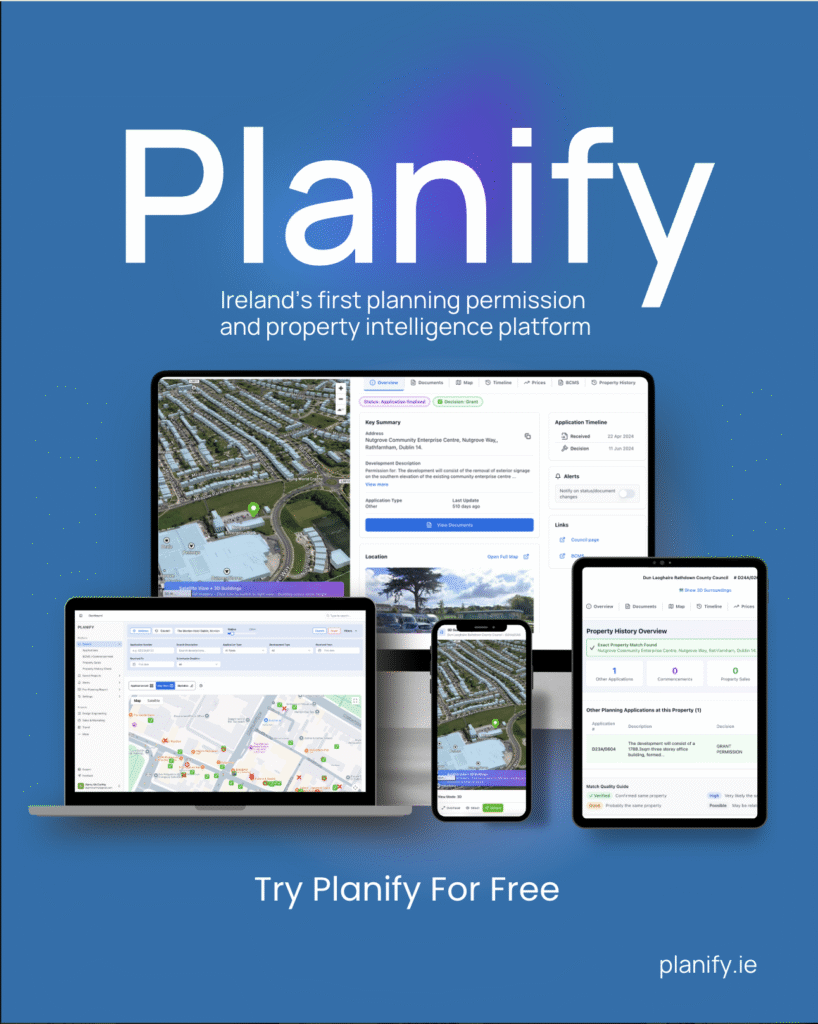Ireland’s Planning Permission Crisis: System “No Longer Fit for Purpose” Warns Leading Architect
Ireland’s planning permission system is failing to deliver homes, infrastructure, and investment at the scale and speed the country needs — and industry leaders are calling for urgent reform.
Veteran architect Tony Reddy recently warned at a major construction seminar that Ireland’s outdated planning framework is a core obstacle to tackling the housing crisis, and may also be undermining key economic strategies such as Foreign Direct Investment (FDI) and international capital flows. The system’s misalignment with ambitious national development targets, like those in the National Planning Framework 2040, creates persistent doubts for builders, investors and communities alike. There is a growing sense that lofty national plans are not matched by practical, coherent support from regional bodies, local authorities, or semi-state agencies.
Planning delays and regulatory complexity are major culprits. Uncertainty around housing scheme approvals and the risk of protracted An Bord Pleanála decisions deter developers from starting projects, exacerbating Ireland’s housing supply gap. Even after initial permission, projects often face lengthy appeals and judicial reviews, adding months or years to timelines and inflating costs. Recent research highlights that Ireland’s permitting process for key infrastructure, like onshore wind farms, is the slowest in Europe — averaging nine years compared to the EU’s six-year norm. Environmental impact assessments, required more frequently here than elsewhere, add further red tape, though current reforms may address this imbalance.
Legislative changes are underway to address these systemic failures. The Planning and Development (Amendment) Act 2025, now in force, aims to streamline decision-making, reduce judicial review risk, and maximise the use of existing planning permissions — for example, by extending deadlines for uncommenced housing schemes and allowing design tweaks without fresh applications. Material contravention rules, while still contentious, are also under review as part of broader efforts to align planning policy with housing and infrastructure urgency. Over 40,000 unbuilt residential units in Dublin alone stand to benefit from these measures, with roughly 15,000 at risk of lapsing in the next two years without intervention.
Yet, core challenges remain. Ireland’s planning system lacks effective tools to address fragmented land ownership, a major barrier to large-scale development. Compulsory Purchase Orders (CPOs) are costly and slow, while newer mechanisms like Urban Development Zones (UDZs) do not incentivise land pooling — meaning many viable schemes stall at the ownership stage. Flood-risk development restrictions, while necessary for sustainability, add another layer of complexity for planners and applicants.
Criticism of the system has reached a tipping point, with some industry voices warning that planners themselves have become “scapegoats” for wider societal and economic failures. The Irish Planning Institute has urged a more evidence-led, performance-focused approach to planning, moving beyond simple housing unit counts to track genuine progress on liveability, climate resilience and infrastructure integration. But negative rhetoric risks worsening a staffing crisis in the sector, with fewer graduates choosing planning as a career.
Ireland’s planning permission regime is at a crossroads. While recent reforms signal political will to unblock housing and infrastructure delivery, deeper structural and cultural shifts are still needed — above all, greater alignment between national ambition and local implementation, clearer rules around An Bord Pleanála decisions, and innovative solutions for land assembly and environmental impact management. Without these, even the most ambitious housing targets will remain out of reach, and public trust in the system will continue to erode.
- Planning delays and uncertainty are stifling housing and infrastructure delivery nationwide.
- New laws aim to cut red tape, extend permissions, and reduce legal risks for developers.
- Fragmented land ownership and flood-risk rules remain unresolved barriers to progress.
- Planners urge a shift toward evidence-led, multi-dimensional performance metrics.
- Without deeper reform, Ireland’s planning permission system may fail to meet critical national goals.
Originally reported in the Irish Examiner on Sun, 12 Oct 2025 03:09:15 +0000. Full story







